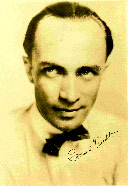
The Conrad Veidt Society

This page is under construction, and many more excerpts will be added. Help from Society members and the general public is requested. Don't assume that we 'must know' about such and such a reference. Email us with details! These excerpts are not intended to usurp the copyright of the published books. Readers are encouraged to find copies of these books to get the rest of the context.
Let's 'Fight for Veidt!'
This redesign sponsored by:
Excerpts from works which mention Conrad Veidt. These excerpts are placed in chronological order (rather than by author).
NON-
Ernst Lubitsch: Laughter in Paradise by Scott Eyman, 1993, Simon & Schuster.
TIME PERIOD late 1926. (Veidt, famous for Cabinet of Dr. Caligari in 1919 and The Student of Prague in 1926. arrived in America by ship in September 1926).
When Conrad Veidt arrived in Hollywood to make The Beloved Rogue, [with John Barrymore] Lubitsch took him to a boxing match. The fighters were lackadaisical and the crowd got restless. ''Fight, fight!'' they began screaming, which caused a flattered Veidt to stand up and make a gracious bow to his adoring fans. ''See, you're famous already.'' cracked Lubitsch. (Page 137).
The Kindness of Strangers by Salka Viertel, 1969, Holt, Rinehart and Winston. ISBN
03076470-
TIME PERIOD late 1920's, after Veidt's arrival in Hollywood, California. The information in ( ) is added by web editor. Bottom of page 132.
''Emil and Gussy Jannings gave a party for us (Berthold and Salka Viertel). Emil,
a lusty character-
All those who had been some time in Hollywood seemed starved for new faces and, as I soon discovered, irritated with the old.
The Jannings lived in a grand-
Throughout the evening the main topic of conversation was the catastrophic impact of the talking films upon the careers of foreign stars, until the exuberant entrance of the precocious 'Mann children,' Erika and Klaus, brightened the atmosphere. They had just arrived in Hollywood on their journey around the world. Very young and attractive, they were refreshingly irreverent and adventurous. They brought with them the atmosphere of Berlin's night life which electrified the party. It was very late when we left with them, discussing the evening on our way back to the hotel. Berthold was fascinated by Jannings's impersonation of 'Jannings in real life,' an amalgamation of his monstrous egotism with roles he had played: Harpagon, Henry VIII, with glimpses of the good natured, straightforward 'Deutscher Michel'. We agreed that it was a great performance; that Conny Veidt was most handsome and a darling; Lubitsch inscrutable but worth knowing better; and Ludwig Berger's fate a warning to European directors.
Those Dancing Years: The Autobiography of Mary Ellis by Mary Ellis.
TIME PERIOD 1934 Read about her take on Conrad Veidt during their filming in of Belladonna.
Conrad Veidt-
TIME PERIOD 1934. An excerpt in its turn from pages 167-
Christopher Isherwood Through the Eyes of Suess
This page is a work in progress, and many more excerpts will be added. Help from Society members and the general public is requested. Don't assume that we 'must know' about such and such a reference. Email us with details! These excerpts are not intended to usurp the copyright of the published books. Readers are encouraged to find copies of these books to get the rest of the context.
Veidt by his Contemporaries